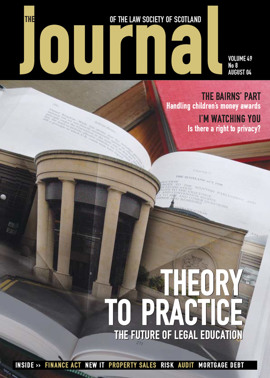Sole survivors?
For some the arguably dubious privilege of being a sole practitioner has come about by design. For others it has been a combination of circumstance and serendipity. However it may have happened, the sole practitioner undoubtedly faces a number of additional burdens not shared by fellow practitioners in partnership.
The debate over the relative merits of being in partnership as against being a sole practitioner is interesting but at the end of the day a little unprofitable. It seems very similar to arguments as to the relative merits of being married or staying single. Being “single” as a lawyer does present the sole practitioner with a number of additional challenges not always faced by professional colleagues in larger firms. Given the increasing complexity of the law and the regulatory aspects of being a solicitor in private practice, it is perhaps time for a serious debate as to whether there is still a place for the sole practitioner in general practice.
The solicitor who practises alone not only has to keep current with developments in the practice of law, but acquire a whole range of other skills to which they may not always be well suited. At times the list can seem endless. We tackle compliance issues and supervise our clients’ account and cashroom. We become the client relations complaint department. An understanding of IT and HR seems mandatory. Some consideration has to be given to business development before moving onto the more mundane tasks of building maintenance, keeping an adequate library and the day-to-day requirements of running any business. And we have to remain familiar with the increasing burdens of red tape.
In larger partnerships this “extra-curricular activity” can be shared, and a solicitor can develop an expertise in employment and HR matters, or the cashroom, or business development. They can keep current on changing regulations or unexpected developments, address changes such as the increasing complexity of money laundering regulations, and keep their colleagues from transgressing the rules. The sole practitioner has no one to share this burden with, but has to maintain currency on all these matters – and that before being able to do any work they can bill someone for.
In addition to keeping up to speed on all the aspects of running a business, sole practitioners also have to maintain levels of expertise and the advice given to clients. Perhaps not so much of a problem for a lawyer who has found a niche market, but surely a major difficulty for anyone attempting to give advice over a range of disciplines. Indeed it must be arguable now that to attempt to do so is extremely difficult if not impossible. The concern for the sole practitioner is that once they start advising a client to seek alternative advice from other firms, it can become habit forming. Generally this is not a good idea. A recent conversation with a business development manager in one of Edinburgh’s larger practices confirmed that once that firm had a foot in the door with regard to say employment law, they would seek to acquire all the business of that client.
Additionally, most sole practitioners I have spoken with are acutely conscious of the problems that their business will face in the event of even a short period of significant illness. We may have health cover, but frequently it does not begin to operate until several weeks have elapsed. Most sole practitioners I know dread such an eventuality. Indeed, they find it hard enough to find time to go on holiday!
Of course it is not all plain sailing for the big firms. On the other hand there is much in the old maxim that a problem shared is a problem solved. To that extent the larger firms undoubtedly benefit from mutual support within their own organisation. I confess to a degree of concern that the singular problems of the sole practitioner do not always appear to be fully understood by those not in that situation. I have wondered if it is a bit like parachuting or bungee jumping. You can watch people do it and listen to them talk about it, but if you have not done it you have never experienced it. From speaking with other sole practitioners it seems to me that there is a consensus that the sole practitioner is finding life more difficult than several years ago. There are obviously exceptions and perhaps there always will be a place for the sole practitioner, but is it not time for a serious debate as to the structure of the profession, how we as a profession are going to supply sophisticated legal expertise to the general public in our traditional areas of conveyancing, family law, wills, and executries, and whether the sole practitioner can continue to exist in the 21st century?In this issue
- Making the system work
- Sole survivors?
- Firm foundations
- The paper trail
- Private lives in public
- IT: what next?
- Roll again
- Destiny's child
- The great day comes
- SOX education
- Peer review: staying on target
- Obituary: James D Wheelans, CBE
- Obituary: JAMES D WHEELANS, CBE (1)
- Time, gentlemen?
- Plain English has landed
- Tangle o' the Isles
- Hunting down the pirates
- Scottish Solicitors' Discipline Tribunal
- Website reviews
- Book reviews
- How much law, anyway?
- FSA's net widens






